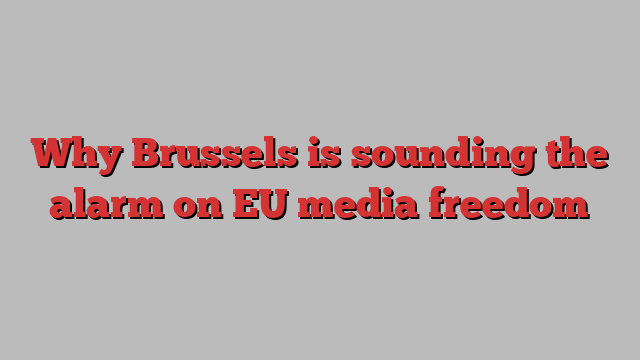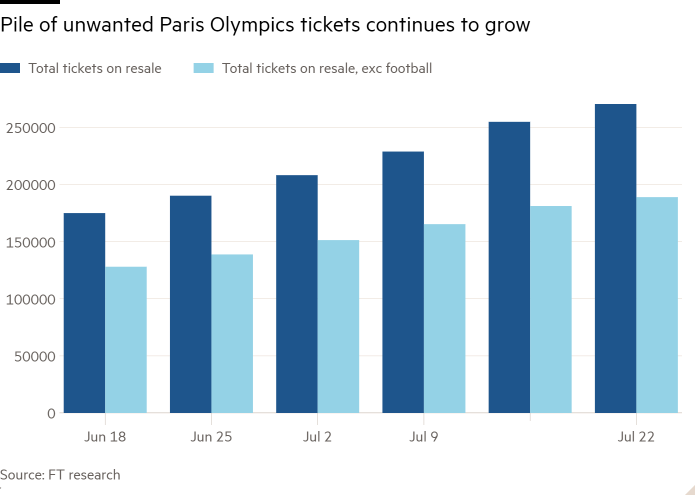
This article is an on-site version of our Europe Express newsletter. Premium subscribers can sign up here to get the newsletter delivered every weekday and Saturday morning. Standard subscribers can upgrade to Premium here, or explore all FT newsletters
Good morning. News to start: The EU is considering a move to freeze Russia’s sovereign assets indefinitely through “open-ended immobilisation”, according to proposals seen by the FT, to solidify plans for them to underpin a $50bn loan to Ukraine.
Today, Laura reveals the EU’s latest annual health check on its own members’ rule of law, and our energy correspondent digs into a study suggesting hydrogen could hinder, not help, efforts to meet the bloc’s climate goals.
Europa Karenina
When it comes to the rule of law, each EU member state is unhappy in its own way, writes Laura Dubois.
Context: For the past five years, the European Commission has published an annual report on the rule of law in the EU, recommending reforms to secure the independence of the judiciary, a free press, and fight corruption, among other things.
“The nature and degree of challenges vary from one member state to another,” the commission writes this year, according to a draft of the report seen by the FT ahead of its publication today.
Media freedom and pluralism are particular worries in 2024. “Journalists’ working conditions and the lack of independence of public service media governance in several countries remain issues of concern,” the commission writes.
Concerns about the editorial independence of public media in Romania, Malta and Hungary have not been addressed, it adds. In Slovakia, the government of Prime Minister Robert Fico this month replaced the public broadcaster, “leading to concerns on [its] future independence”.
The commission also points its finger at Italy, where there are “persisting challenges related to the effectiveness of [the public media’s] governance and funding system”. Prime Minister Giorgia Meloni’s government has recently been accused of editorial interference at public broadcaster Rai.
Civil society faces “serious challenges” in some member states, the commission finds. In Hungary, “smear campaigns and the vilification of independent [civil society organisations] remain a current practice”, and there are concerns about state financing of groups behind such campaigns.
The situation for civil society has also worsened in Slovakia, particularly for those watching the state and safeguarding human rights, the commission writes.
But there is some positive news. Poland, which had previously been in the crosshairs of the commission over judicial independence, is reversing “some of the negative effects of the contested justice reforms”.
In the future, the commission wants to tie the rule of law more closely to what all 27 EU countries covet most: money.
It aims to build a “closer link” between the recommendations of the report and funding from the EU budget. This echoes comments by its freshly re-elected president Ursula von der Leyen’s last week.
“EU funding can be further focused on helping national efforts to fight corruption and to protect the EU financial interest, investing in upholding the rule of law,” the draft says.
Chart du jour: Price politics

Lack of demand for expensive resale tickets to the Paris Olympic Games could see athletes competing against a backdrop of empty seats.
Not so clean
A new study shows that the EU’s plans for what constitutes so-called low-carbon hydrogen could undermine the bloc’s climate goals, writes Alice Hancock.
Context: Hydrogen is seen as a critical means for heavy industries such as steel and chemicals to decarbonise their operations. The European Commission is due to present a definition of low-carbon hydrogen — mostly made with natural gas, alongside technologies capturing the resulting carbon emissions — in the autumn.
But think-tanks and NGOs worry that lobbying by the fossil fuel sector, which likes to promote carbon capture as a way to continue burning oil and gas, has lowered Brussels’ ambitions.
If the parameters for low-carbon hydrogen are not strong enough, the EU risks getting stuck with polluting fuels, warns German think-tank Agora Energiewende in a report published today.
According to a draft seen by the FT, Brussels is currently thinking of setting a threshold for emissions from low-carbon hydrogen at 3.38kg of CO₂ per kg of hydrogen produced.
But Agora’s study shows that to meet its climate goals and boost efficiency, the EU should set a decreasing threshold that starts at 3.38kg of CO₂ per kg of hydrogen, sliding to 3kg in 2030 and to 1kg of CO₂ in 2050.
That should also boost so-called green hydrogen, which is produced entirely using renewable energy and has no emissions, but is at present more expensive. According to Agora’s modelling, green hydrogen will only reach the same price as more polluting production methods around 2045.
“These rules from the commission will define where the billions of euros for hydrogen production go in years to come,” said Agora’s Matthias Buck.
What to watch today
-
G20 finance ministers hold two-day meeting in Rio de Janeiro, Brazil.
-
German defence minister Boris Pistorius hosts British counterpart John Healey in Berlin.
Now read these
Recommended newsletters for you
The State of Britain — Helping you navigate the twists and turns of Britain’s post-Brexit relationship with Europe and beyond. Sign up here
Chris Giles on Central Banks — Your essential guide to money, interest rates, inflation and what central banks are thinking. Sign up here
Are you enjoying Europe Express? Sign up here to have it delivered straight to your inbox every workday at 7am CET and on Saturdays at noon CET. Do tell us what you think, we love to hear from you: [email protected]. Keep up with the latest European stories @FT Europe